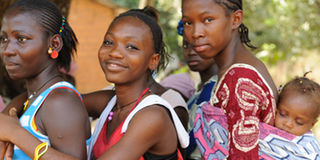Give youth a right to contraceptives: NGOs

The organisations want sexually active adolescents and the youth to access all contraceptive methods, including long acting ones wherever they are in the world regardless of their marital status.
What you need to know:
Speaking with journalists, Pathfinder International Caroline Crosbie senior vice president said a quarter of the world's population was comprised by adolescents and young people, who were sexually active and wanted to prevent or delay pregnancy because they wanted to finish school, get employment, get married or space children.
Bali. More than 40 leading global health and development organisations attending an international conference on family planning in Bali, Indonesia, have endorsed a statement that calls for the expansion of contraceptive choice for young people to include long acting reversible contraceptives.
Speaking with journalists, Pathfinder International Caroline Crosbie senior vice president said a quarter of the world's population was comprised by adolescents and young people, who were sexually active and wanted to prevent or delay pregnancy because they wanted to finish school, get employment, get married or space children.
“However, these young people don’t have access to a full range of modern contraception methods, including long acting ones,” she said.
She called upon governments to meet young people’s right to have access to contraceptives, including long acting ones. The emphasis on long acting methods comes from the fact that “young people have sporadic sexual activity before marriage so it is useful to have long active methods,” said Venkatraman Chandra-Mouli, WHO senior scientist in the department of Reproductive Health Research.
Chandra-Mouli said adolescents were eligible to use all methods of contraceptives as adults because they were medically safe according to WHO guidelines.
He said there was no medical reason to refuse them contraception except for sterilisation. WHO’s medical eligibility for contraceptive use states that “age alone does not constitute a medical reason for denying any method to adolescents.”
A statement released by the 40 organisations says global efforts to prevent unintended pregnancies and improve pregnancy spacing among adolescents and the youth will reduce maternal and infant morbidity and mortality, decrease rates of unsafe abortion, decrease HIV/STI incidence, improve nutritional status, keep girls in school, improve economic opportunities and contribute toward reaching sustainable development goals.




